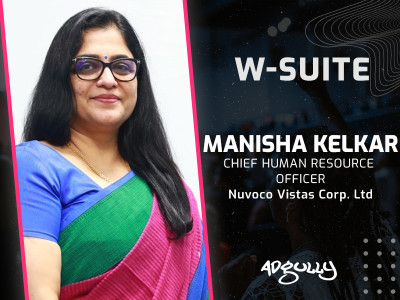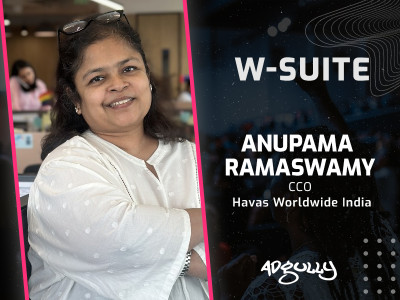The W Suite | Women need to come out of self-imposed bias: Loma Hosne Ara
Adgully’s ‘The W-Suite’ series has been featuring interactions with influential women leaders in India, who share some deep insights on what being a woman leader means in India’s business landscape, the mantras to succeed, achieving work-life balance, pay parity and much more.
As Director - People & Culture, IPM India Wholesale Trading Pvt Ltd, Loma Hosne Ara is responsible for the development of human resource strategy to build competitive advantage through people. Loma started her career with Unilever, Bangladesh, where she spent 15 years of her professional life. She joined Philip Morris in Bangladesh in 2014, before moving to India in 2016. As Product Group Manger and Brand Manager in marketing, she handled international brands across various categories. She believes that with passion, persistence and mental agility one can overcome all challenges be it professional or personal.
How would you define today’s woman leader?
Women have proven their mettle across industries and roles, globally. They are recognised to be ambitious and talented professionals with superior foresight and resilience. In my opinion, women today are equal, in all aspects, maybe even stronger!
What are the foremost attributes that women leaders in today’s business ecosystem must possess?
In the current business scenario, it is important to be assertive, empathetic, and resilient with an appetite for risk-taking.
Being assertive, in a manner, where there is balance between aggression and a mild temperament. It is important to clearly affirm one’s ideas and beliefs, whilst also respecting a possible rebuttal.
Being bold and having the ability to take calculated risks, is key to converting challenges into opportunities, taking measured steps and showing tangible results, while generating more value for the organisation.
Empathy is a key trait amongst successful women leaders across the globe, which is instrumental in building strong relationships with employees, and external stakeholders like business partners and customers. It is a critical skill, acquired over time, requiring patience and emotional intelligence.
In a fast-paced landscape, resilience holds the key to success. It is important to be able to persevere and move on from a roadblock; as it’s no more about ‘survival of the fittest’ but about ‘survival of the adaptable’. Those who can quickly spring back and re-shape their work will ultimately succeed.
Despite the qualifications, aptitude and experience, why do you think we don’t see the expected number of women business leaders, especially when it comes to boardroom decision-making?
There are many women leading the way in the boardroom today. Having said that, while women are efficient multi-taskers, they’re also entrusted with numerous personal responsibilities like childcare and home, while balancing their careers. Organisations should aggressively promote initiatives that enable women talent reach leadership positions, including multi-sectoral experience, a well phased growth & opportunity graph and flexibility at work. These will equip them to punch their full weight forward.
What more do Indian corporates need to do to encourage and groom women leaders?
An important factor that helps in grooming women for leadership roles is cross-functional experience, to be able to comprehend the interdependence, impact and potential of each function in the business. Hence, rotation of roles is important to build key competencies. At IPM India, cross functional and cross border experience are key components to development, which enable our employees to evolve into well rounded professionals.
Furthermore, there needs to be a conscious focus on building diversity within the company to ensure that women feel confident and take up more management roles, eventually making it to the board level. I believe there needs to be a certain critical mass, of any segment of the workforce, for them to share their thoughts and push innovation – in line, for instance, at IPM India, our target is to reach 40% participation of each gender in the workforce by 2022. But increasing the underrepresented number is one part; the most crucial element is making the number work, that is, having an inclusive work environment where everyone can perform and grow to their full potential. Inclusion is crucial irrespective of gender, race or faith. At IPM, “Inclusion” is one of the five energies of our culture signature that defines how we embrace and embed inclusion in our organisation.
According to you, what are the Do’s and Don’ts for today’s women to break through the glass ceiling?
The first and foremost step in shattering the glass ceiling is to recognise and come out of self-imposed bias, second guessing and limitations. As we see higher participation of women in the workforce, it is important to have the right kind of attitude and confidence at work. Women often feel reluctant in ‘asking’ for what they aspire - from a deserved promotion to a role or project that interests them. It is important to put yourself out, showcase your merit and capability – seek and work towards what you deserve, and aim for.
It’s imperative to get over the hesitation, be it in sharing your point of view, or in launching your business idea. Don’t be afraid of failure, it is the most enriching experience one can get. Leverage it to pave the path for future success.
How acute is the gender pay gap issue in India today? What needs to be done to address this in an effective manner?
As per a 2019 report from a leading employment consultant, the average gender pay gap in India stood at 19 per cent in favour of men. However, the pay gap rises as the experience and education of the employee increases. Companies need to be conscious of the value and diversity of thought that women bring with them, leading to more disruption and hence innovation.
This will not only help in companies offering the requisite dues to women in the workforce, but also decrease the gender pay gap. We also undertook our journey towards better gender representation and inclusion in 2015. In 2018, IPM India was India’s first organisation to receive Equal-Salary certification from the independent, not for profit, EQUAL-SALARY Foundation.
What are the five most effective lessons that you have learned as a woman leader?
Well, the most effective lessons that I’ve learned as a leader (and not necessarily a woman leader) are:
- Flexibility and adaptably is key; one should be ready to give up space to win together as a team
- Curiosity and learning is crucial; it is never too late to learn anything new
- Be ‘hands on’; always ready to roll up your sleeves and get your hands dirty
- Be engaged and around young talent; their ideas and energy is infectious and one can learn a lot from them
- If you want to make a difference, put your heart and soul together, it always pays
How challenging has it been for you to maintain a balance between career goals and family responsibilities? What is your mantra to maintain that balance?
At the onset, I must admit, sometimes it can get challenging to maintain balance. The truth is, as much as we’d like to be, and possibly are most days - we cannot always be ‘superwomen’, and we need to prioritise depending on the need of the hour.
Having the right support system/ ecosystem is crucial. I was very lucky to have my mother, husband and staff around me when my children were very young and I had to invest significant time at work, which entailed extended business travel. I felt guilty many times, missing important occasions/days, but then I had to prioritise and do what was needed. To all working mothers, I’d say, the guilt will take over from time to time, but make sure to be present where you are needed most. I try to be there for parent teacher meetings and to watch my child’s performance at school. These moments are important to me. I am also very lucky to be a part of an organisation that gives me flexibility in managing business and balancing my own time. In the end, it is the output that matters.
How prevalent are the instances of Sexual Harassment in workplaces in India? What should the industry collectively do to tackle such a serious issue?
There is much better awareness on the issue within organisations, today. It is critical that we come together as corporates and decide on a stringent, zero tolerance standard procedure, once an incident gets reported. Enforcement of a thorough action plan will help reduce its occurrence, I believe.
















Share
Facebook
YouTube
Tweet
Twitter
LinkedIn